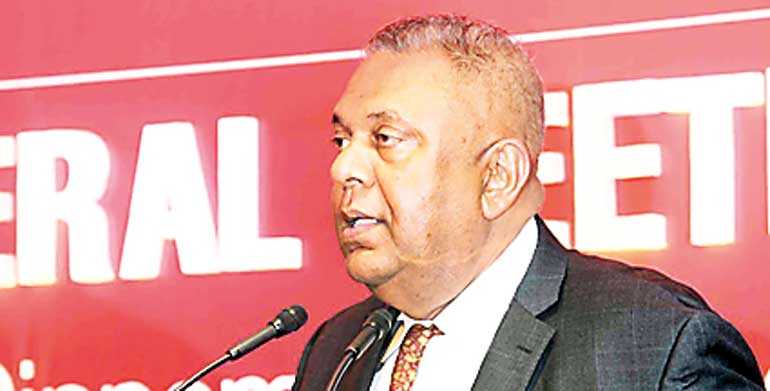Wednesday Feb 25, 2026
Wednesday Feb 25, 2026
Saturday, 30 June 2018 01:02 - - {{hitsCtrl.values.hits}}

By Uditha Jayasinghe
Finance Minister Mangala Samaraweera has backed Sri Lanka’s flexible exchange rate policy, pointing out that currencies in regional markets have also depreciated against the dollar and insisting it has assisted policy makers to maintain a stable macroeconomic environment.
Speaking at the Ceylon Chamber of Commerce Annual General Meeting on Thursday, Minister Samaraweera highlighted the depreciation of other currencies pointing out that they have depreciated more against the dollar and the Sri Lankan Rupee and stressed that it has assisted the country to remain attractive to investors.
The Government had recently come under fire for allowing market forces to determine the exchange rate, which critics fear would push up inflation and put additional pressure on the poor.
“Much has been said about the recent depreciation of the currency. The policy of this government is that the currency should be determined by market forces. The recent depreciation of the rupee is due to external factors, particularly the rise in policy interest rates in the United States. This has affected all emerging and frontier market economies all over the world,” the Minister said.
“Whilst the Sri Lankan Rupee has depreciated 3.3% this year, the Indian Rupee has depreciated by 8%, the Pakistani Rupee by 10.5%, Indonesian Rupiah by 5.2%, and Thai Bhat by 5.4%. In fact in the last couple of days the Sri Lankan Rupee has appreciated slightly as macroeconomic fundamentals do not warrant a serious depreciation of the currency.”
Minister Samaraweera was upbeat of Sri Lanka’s economic performance despite the country recording below 4% growth in the last five quarters, including 3.2% in the first quarter of 2018.
“We are already seeing the positive materialisation of the benefits of this overall macroeconomic stabilisation. Listed corporate earnings in the first quarter of 2018 had grown 29%. Exports and FDI had their best years respectively in 2017. Unemployment was down to 4% in 2017.”
He emphasised that going forward, the Government was committed to achieve responsible fiscal management. “This is essential for us to be able to manage the upcoming debt repayments that this Government inherited.”
The Government will also divest State-owned Hilton and Hyatt hotels next month, Samaraweera said. The Finance Ministry is also engaged in “putting the final touches” on the Customs Ordinance and would put the new Excise Ordinance for Cabinet approval at the end of July.
“Divestment on non-strategic State assets has taken longer than expected but this process is being fast tracked and we expect to see results soon. This will help raise finance for the Treasury and more importantly will create space for private enterprise to drive these sectors,” he added.